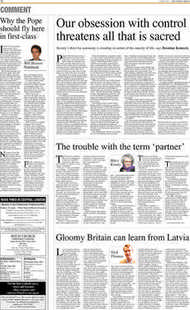Page 12, 4th June 2010
Page 12

Report an error
Noticed an error on this page?If you've noticed an error in this article please click here to report it.
Tags
Share
Related articles
Age Concern's Bogus Debate
Where Secularism Meets Its Match
The Killer Entertained In Catholic Social Clubs
Alcoholism : Do You Care Enough?
`distressing' Advice On Children And Drink
Our obsession with control threatens all that is sacred
Society’s thirst for autonomy is clouding its notion of the sanctity of life, says Brendan Kennedy People suffering from a severe dependence on alcohol oftentimes react with strong resentment whenever someone says they must not drink. Many have even acted out their resentment by relapsing into their previous drinking behaviour. It is as if in trying to prove they are in control of their lives they turn to something over which they have no control.
This need to be in control is not limited to people suffering from alcoholism, but is deeply embedded in the psychological make-up of each individual. We come into this world as helpless infants and through attachments to significant adults we feel secure. But our development involves an intensifying need to experience ourselves as autonomous individuals who are masters of our own lives and in control of our own destiny.
The emphasis on personal autonomy and responsibility over the last 50 years often challenged traditional moral attitudes, a clear example of which was the campaign that led to the Abortion Act of 1967. The original act permitted abortions within strict parameters, and primarily where there was evidence of a serious handicap or a risk to the life of the mother. This has gradually been expanded in response to campaigns supporting a woman’s rights over her own body resulting in a situation where we now have terminations almost on demand, resulting in approximately 200,000 a year. This outcome, which is very different from the intention underlying the original law, is an example of the law of gradualness whereby a relaxation in law results in the gradual erosion of the underlying values the law was intended to protect. Today the demand for complete control over one’s choices and decisions is centred on assisted suicide. Writing in the Times on August 1 2009 Matthew Parris stated: “Suicide is the greatest of human freedoms, underwriting all others. The possibility of suicide is what makes life voluntary and each new day an act of will. The knowledge that I’m here by choice, that every breath I take I take by choice, injects into my soul a transcendent joy. That we can let go whenever we want is for me the deepest sort of thrill.” While the Suicide Act of 1961 decriminalised suicide it also states in Part 2 (1) that: “A person who aids, abets, counsels or procures the suicide of another, shall be liable on conviction on indictment to imprisonment for a term not exceeding 14 years.” This has left terminally ill people, or those with degenerative diseases, who wish to end their lives feeling unable to engage the support of family lest their loved ones be imprisoned for assisting their suicide.
An example of this was Jane Aiken Hodge, aged 91, who took an overdose and died on June 17 2009. She left instructions that she was not to be resuscitated and had been unable to discuss her plans with her children or her doctor lest she incriminate them. Having taken the overdose she lay in bed alive but deeply unconscious for four days until she eventually died. This is a heart-rending story of a woman all alone with her thoughts and feelings as she hoarded her pills and planned her death. It seems like an end to a life that is not befitting the dignity of the human person.
Miss Hodge chose suicide even though she was not suffering from a terminal illness. Similarly the late Daniel James, the 23-year-old who was left totally paralysed following an injury received while playing rugby, travelled to Switzerland with the help of his parents where he availed of assisted suicide.
While the situation of Miss Hodge and Daniel James touches our hearts, the situation of others who are terminally ill or suffer appalling conditions and wish to end their lives rather than endure the intolerable condition any longer evoke even greater sympathy. We can appreciate the determination with which Debbie Purdy fought to have her position in the eyes of the law clarified. She demanded to know if she waited until her condition had reached a stage where she could no longer travel alone to Switzerland, would her husband be charged under the act of 1961 for assisting her suicide. If so she felt she would have to travel earlier while she could still travel alone.
Is Matthew Parris right in saying suicide is the greatest of human freedoms? Was Freud right when he saw the need to assert personal autonomy and control over one’s choices to be so all-encompassing that he described it as a death instinct which seeks “to ward off any possible ways of returning to inorganic existence other than those which are immanent in the organism itself ... the organism wishes to die only in its own fashion”.
Or is the greatest of human freedoms the ability to transcend self and accept that while pain and suffering are unwanted they do not diminish the sanctity and meaning of human life? Is there not a danger of becoming enslaved by an exaggerated sense of personal autonomy and control and, like the person severely dependent on alcohol, we too may try to assert control in a manner destructive of all we hold sacred?
It is right and proper that we sympathise with those who choose to end their lives, and with their families who find themselves in this terrible situation of wanting to help loved ones but are restricted by the law. But should the law be changed to accommodate their needs and lessen their distress? When we see how the relaxation in the law on abortion has led to the situation we have today, can we assume that a relaxation in the law on assisted suicide will be any different?
In a paper entitled “The Impracticality of Proportionalism” in 1985 Bart Kiely SJ referred to the gradualness of law which he described as the situation where “the law remains valid in itself, even though effective freedom may at present be too limited to allow its observance; while the law as remaining valid stands also as a permanent call to the overcoming of existing limits upon effective freedom”. The natural impulses to assist loved ones who suffer may well cloud people’s ability to accept that human life retains its value and sanctity despite illness or incapacity.
Laws are enacted to protect the common good and uphold the values that bind society. While personal autonomy is to be upheld as a value, laws stand as signs that there are other values espoused by society which take precedence over these.
Brendan Kennedy works as an addiction counsellor in west Belfast and is a guest lecturer on psychodynamic therapies to students of the doctoral course in Clinical Psychology at the Queen’s University in Belfast. He holds master’s degrees in Theology and Psychoanalytic Studies
blog comments powered by Disqus





















